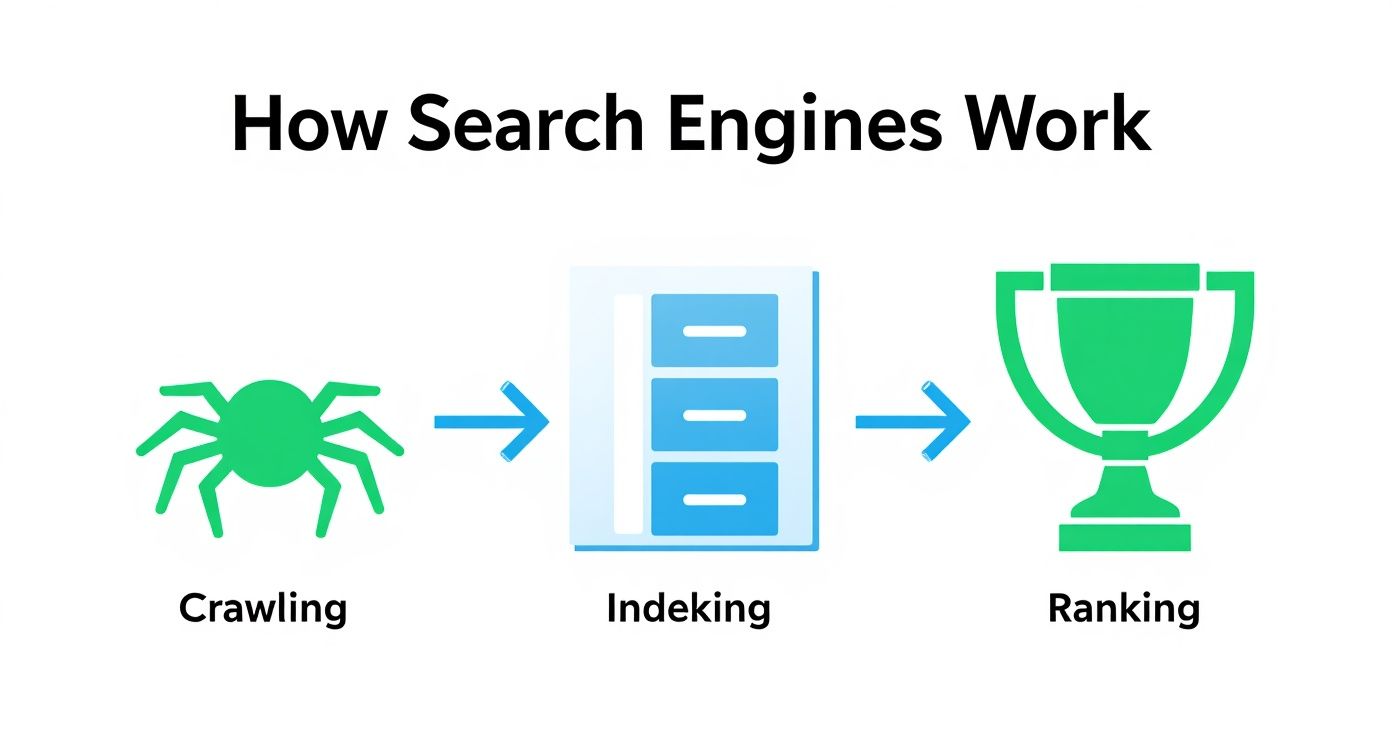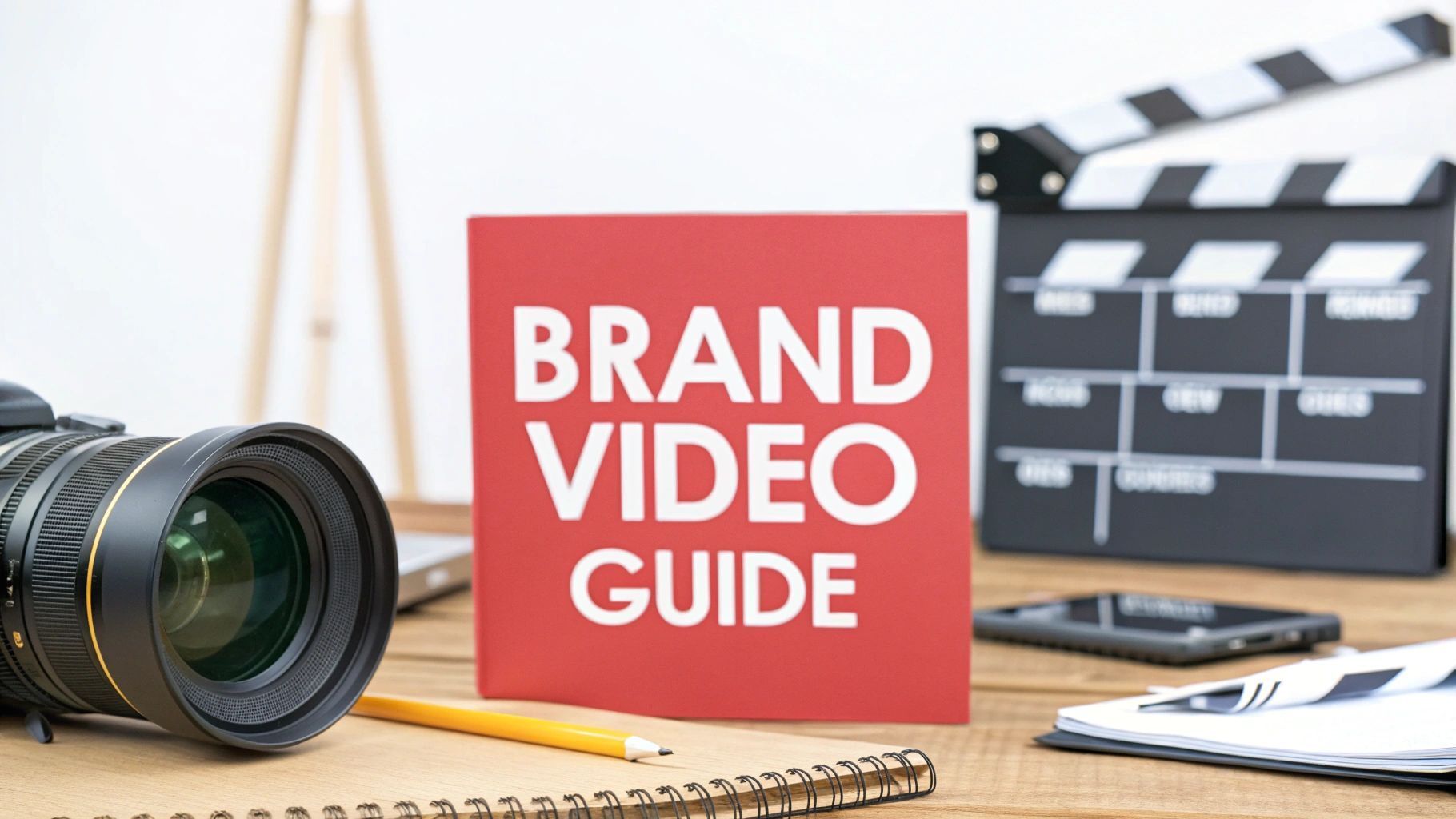What Is SEO and How Does It Work A Simple Guide
Search Engine Optimisation (SEO) is simply the process of improving your website so it shows up more often, and higher up, when people search for what you offer on Google.
The more visible your pages are, the more likely you are to attract genuine interest and pull potential customers into your world.
Unlocking Visibility: How Search Engines Work
At its heart, SEO is about understanding what your customers are searching for online and then shaping your website to meet that exact need.
Think of Google as the world’s biggest, most efficient librarian. Its job is to sift through the entire internet, categorise everything, and present you with the most relevant, high-quality answers to your questions. When you type something into that search bar, you’re not searching the live internet – you’re searching Google’s meticulously organised copy of it.
To pull this off, search engines rely on a constant, three-step process: crawling, indexing, and ranking. This is how they deliver fast, accurate, and genuinely useful results every single time.
This infographic gives you a great visual overview of how search engines discover and organise content online.

This journey from discovery to evaluation is what decides whether your website lands on page one or gets lost in the digital static.
Let's break down exactly what that means for your business.
How Search Engines Work: A Three-Step Process
Search engines are constantly working to deliver the best results. Here’s a look at the three core stages that make it all happen.
| Stage | What It Is | Why It Matters for Your Business |
|---|---|---|
| 1. Crawling | Automated bots (spiders) follow links to discover new and updated pages across the web. | If Google’s crawlers can't find or access your pages, you're invisible. Good site structure is key. |
| 2. Indexing | The search engine analyses and stores the content from crawled pages in a huge database (the index). | This is your ticket to the show. If your page isn't indexed, it cannot appear in any search results, period. |
| 3. Ranking | When someone searches, the engine sorts through its index to find and order the most relevant results. | This is where your SEO efforts pay off. Higher rankings mean more traffic, leads, and sales. |
Getting these three stages right is the foundation of any successful SEO strategy.
The Final Step: Ranking
Once a page is indexed, the real game begins: ranking .
This is where all your hard work in SEO truly comes to life. When you enter a search query, the search engine scans its index for the most relevant pages and lists them in order. To do this, it weighs hundreds of different search engine ranking factors – everything from the keywords you use and your site speed to mobile-friendliness and the quality of other websites linking to you.
Here in the UK, one player dominates this space completely. Google holds a staggering 92.48% of the search engine market share, making its rules the ones that matter. This means any effective UK SEO strategy has to be laser-focused on what Google deems valuable and relevant.
The Four Pillars of a Successful SEO Strategy

SEO isn't a one and done task you can just tick off a list. The best way to think about it is like building a house. For the whole structure to be sound, you need several strong pillars holding it up. If you neglect one, the whole thing starts to feel wobbly.
To really get what SEO is and how it drives results, you have to break it down into its four core pillars. Each one is a different area of focus, but they’re all interconnected. Getting them to work together is what builds a powerful, lasting online presence.
These pillars are On-Page SEO, Off-Page SEO, Technical SEO, and Local SEO. Master how they all fit together, and you’ve found the key to consistent, long-term business growth.
On-Page SEO: What You Control Directly
On-Page SEO covers everything you do on your actual website pages to help search engines make sense of your content. This is your chance to tell Google exactly what your page is about and who it’s for. It’s the most fundamental part of SEO and the area where you have the most direct control.
Imagine you’ve written a brilliant article on electric van maintenance. On-Page SEO is like giving that article a clear title, proper chapter headings, and a table of contents. It makes it dead simple for both human readers and search engine crawlers to get the gist of it straight away.
The core elements of On-Page SEO include:
- Keyword Optimisation: Weaving relevant keywords naturally into your titles, headings, and body copy without stuffing them in unnaturally.
- High-Quality Content: Creating genuinely valuable, informative, and engaging content that nails the user's search query.
- Title Tags and Meta Descriptions: Writing compelling titles and summaries that show up in search results and make people want to click.
- Internal Linking: Connecting pages on your own website to guide users and search engines towards related content.
By getting your On-Page SEO right, you're laying a rock-solid foundation. You’re making sure that when search engines find your content, they instantly recognise its value and its relevance to your audience.
Off-Page SEO: Building Authority and Trust
While On-Page SEO is about what's on your site, Off-Page SEO is all about building your website's reputation and authority across the rest of the internet. Think of it as earning votes of confidence from other respectable websites. These "votes" usually come in the form of backlinks —links from other sites pointing to yours.
A single, high-quality backlink from a respected industry blog is like getting a glowing personal recommendation from an expert. It’s a powerful signal to Google that your content is trustworthy and authoritative, which can give your rankings a serious boost. This pillar is all about showing that other people value what you have to say.
Technical SEO: The Engine Under the Bonnet
Technical SEO is all about the behind the scenes stuff that helps search engines crawl and index your website without any hassle. If On-Page SEO is the content of a book, Technical SEO is the quality of the paper and binding—it makes sure the book is accessible and easy for anyone (or any bot) to read.
This pillar covers everything from how fast your pages load to whether your site is secure and mobile-friendly. A dodgy technical setup can stop Google from ever finding your best content, no matter how good it is. For example, a slow-loading page might cause 53% of mobile users to give up and leave, which sends all the wrong signals to search engines.
Making sure your site is technically healthy is non-negotiable. Running a thorough technical SEO audit is the best way to find and fix issues that could be holding you back. As you build your strategy, digging into guides on mastering search engine optimization techniques can also offer a deeper understanding of these technical details.
Local SEO: Winning in Your Neighbourhood
Finally, for any business with a physical address or one that serves a specific area, Local SEO is an absolutely essential pillar. It’s all about optimising your online presence to show up for relevant local searches, like "coffee shop near me" or "plumber in Devon."
This is how you connect with customers right in your community. It involves managing your Google Business Profile, keeping your name, address, and phone number consistent everywhere online, and collecting positive customer reviews. Get this right, and you'll appear in Google's "Map Pack" and local search results, driving more footfall and local leads.
Why High-Quality Content Is the Engine of SEO

While the technical bits and off-page signals build the foundation, high-quality content is the engine that actually drives your website forward.
Think about it. Search engines exist for one reason: to give people the most relevant, useful answers to their questions. Without valuable content, your website is just a technically sound shell. It gives search engines no reason to rank you and users no reason to visit.
If someone searches for "best running shoes for beginners," they aren't looking for a perfectly coded but empty webpage. They want detailed reviews, real-world comparisons, and advice they can trust. Giving them that is the heart of content-driven SEO.
This means that understanding what is SEO and how does it work today is less about finding loopholes and more about becoming a genuinely trusted resource. Creating content that helps, informs, or entertains is the single most powerful way to earn high rankings and build an audience that keeps coming back.
Understanding the 'Why' Behind the Search
To create content that hits the mark, you have to get inside your customer's head and understand the why behind their search. This is what we call search intent —the underlying goal a person has when they type something into Google.
Just targeting a keyword isn't enough anymore. You need to match the type of content you create to what the user actually needs at that moment.
For example, a person searching "how to fix a leaky tap" wants a step by step guide or maybe a quick video tutorial. They absolutely do not want a sales page for a local plumber. On the flip side, someone searching "emergency plumber Devon" has a clear and immediate need for a service. Aligning your content with that intent is what separates the winners from the websites that never get found.
Search intent generally falls into four main buckets:
- Informational: The user needs information. (e.g., "what is corporation tax?")
- Navigational: They're trying to find a specific site. (e.g., "Superhub login")
- Transactional: They're ready to buy something. (e.g., "buy nike air max trainers")
- Commercial Investigation: They're in the research phase, comparing their options before they buy. (e.g., "best SEO agency UK")
From Keywords to Compelling Content
Keyword research is where it all begins. It’s the process of finding the exact words and phrases your ideal customers are using to find the solutions you offer. Tools like Google Keyword Planner or Ahrefs give you the blueprint, showing you what people are searching for and how often.
But once you have those keywords, the real work starts. The goal isn't to stuff them into a page, but to create a piece of content that covers the topic so well it becomes the definitive answer. This is where you build authority and trust, a core principle we explore in our guide to content marketing services.
The best content doesn't just rank on Google—it establishes your brand as the go-to authority in your field. It turns a one-time visitor into a long-term customer by consistently providing value.
Content Quality Is Non-Negotiable
Google gets smarter every year at telling the difference between thin, low-effort articles and genuinely helpful, in-depth content. This laser focus on quality makes sense when you look at the numbers. The UK SEO market hit a value of £19.2 billion in 2023, a figure fuelled by the fact that 42% of UK consumers start their search for a product or service on a search engine.
What does this tell us? Businesses that invest in brilliant, optimised content are the ones meeting customers exactly where they're looking.
This means your content absolutely must be:
- Original: Don't just rehash what others have said. Bring a unique perspective or fresh information to the table.
- Well-Researched: Back up your claims with credible facts and data. Show your work.
- Well-Structured: Make it easy to read. Use clear headings, short paragraphs, and bullet points to help people scan and digest the information.
- Comprehensive: Aim to be the best answer out there. Cover the topic so thoroughly that your reader doesn't need to hit the back button and look for another result.
How to Measure SEO Success with the Right Metrics

Pouring time and money into SEO without tracking your results is like driving with your eyes closed. Sure, you’re moving, but you have no idea if you’re heading in the right direction.
To figure out if your SEO efforts are actually paying off, you need to stop chasing vanity numbers and start focusing on the metrics that show real commercial impact. Measuring success means looking past surface-level figures like total website visits and zeroing in on Key Performance Indicators (KPIs) that connect directly to your business goals.
These KPIs tell a story. They show you what’s working, what’s a waste of time, and where to double down.
The KPIs That Actually Matter
Let’s be honest, not all data is created equal. It’s easy to get excited about a spike in social media likes, but real SEO success is measured by growth in visibility, engagement, and most importantly, revenue.
Forget the fluff. Here are the essential KPIs you should be tracking:
- Organic Traffic: This is the lifeblood of SEO. It’s the number of people landing on your website from unpaid search results. A steady climb here is the clearest sign that you’re becoming more visible to your target audience.
- Keyword Rankings: Knowing where you stand for your most important keywords shows you how you’re stacking up against the competition. Just moving from page two to page one for a high-intent keyword can be a complete game changer for your traffic.
- Conversion Rate: This is the money metric. It’s the percentage of visitors from organic search who take a desired action—making a purchase, filling out a form, or signing up. This tells you if your traffic is actually valuable.
- Click-Through Rate (CTR): Pulled straight from Google Search Console , CTR shows you what percentage of people click on your website after seeing it in the search results. A high CTR means your page titles and descriptions are hitting the mark.
Keeping an eye on these core metrics gives you a clear, data-backed picture of what's going on. For a wider perspective on how these fit into your marketing, our guide on mastering marketing performance metrics is a great next step.
SEO isn't just about getting seen; it's about getting seen by the right people and convincing them to act. A high conversion rate from your organic traffic is the ultimate proof that your strategy is delivering a real return on investment.
Essential SEO KPIs and What They Tell You
To make sense of it all, it helps to see what each metric really means for your business. Here’s a quick breakdown of the most important KPIs.
| KPI (Key Performance Indicator) | What It Measures | Why It Is Important |
|---|---|---|
| Organic Traffic | The number of visitors arriving from unpaid search engine results. | It's a direct measure of your visibility in search and the effectiveness of your overall SEO strategy. |
| Keyword Rankings | Your website's position in search results for specific, targeted keywords. | Shows how well you compete for relevant search terms and helps identify opportunities for growth. |
| Conversion Rate | The percentage of organic visitors who complete a key business goal (e.g., a sale or lead). | This is the ultimate test of ROI, proving that your traffic is commercially valuable. |
| Click-Through Rate (CTR) | The percentage of searchers who click your link after seeing it in the results. | A high CTR indicates that your titles and meta descriptions are compelling and relevant to users. |
| Backlinks | The number and quality of links pointing to your website from other sites. | Crucial for building authority and trust with search engines, which directly affects rankings. |
| Bounce Rate | The percentage of visitors who leave your site after viewing only one page. | A high bounce rate can indicate poor user experience or irrelevant content for the search query. |
These metrics, when tracked together, provide a powerful, holistic view of your SEO performance, moving you beyond guesswork and into data-driven strategy.
The Right Tools for Tracking Your SEO Performance
Trying to track all this manually would be a nightmare. Thankfully, there’s a whole ecosystem of tools built to help you gather, analyse, and make sense of your SEO data. The demand for these platforms is soaring for a reason—data is everything in modern business.
The UK SEO software market, for instance, generated USD 5.4 billion in revenue in 2024 and is on track to more than double to USD 11.3 billion by 2030. This explosive growth, detailed in reports about the rapid expansion of the SEO software market, shows just how essential these tools have become.
Here’s a look at the tools every business should have in its arsenal:
- Google Search Console (GSC): This is non-negotiable. It’s a free tool directly from Google that shows you exactly how the search engine sees your site. You get insights on keywords, CTR, and any technical red flags holding you back.
- Google Analytics 4 (GA4): Another free must-have, GA4 tells you what users do after they land on your site. You can track organic traffic, see which pages are the most engaging, and measure conversions to prove the commercial value of your work.
- Dedicated SEO Platforms ( Semrush , Ahrefs ): For businesses ready to get serious, these all in one platforms are worth their weight in gold. They offer powerful features for deep dive keyword research, competitor analysis, backlink tracking, and full site audits.
Your choice of tools will depend on your budget and goals, but starting with Google’s free offerings gives you a rock-solid foundation for making smarter, data-driven decisions and proving the value of your SEO efforts.
Common SEO Mistakes and How to Avoid Them
Getting started with SEO is a game changer, but knowing what not to do is just as critical as knowing what you should. So many businesses, with the best of intentions, stumble into common traps that can tank their rankings and undo months of hard work.
Let’s get one thing straight: SEO isn't a one and done project. It’s a process. The digital world is always in motion – search engine algorithms get updated, and your competitors are constantly tweaking their tactics. If you treat SEO as a continuous effort, you’ll be ready to adapt and hold onto your hard-earned visibility.
Steering clear of these mistakes is fundamental to building a strategy that delivers long-term results. It’s about making sure every bit of effort pushes you forward, not holds you back.
Neglecting Mobile Experience
Think about it: how many times a day do you pull out your phone to search for something? Your customers are no different. A huge chunk of your audience will find you on a smartphone, and ignoring their experience is a massive own goal.
Google knows this, which is why it prioritises mobile-friendly websites in its rankings. A site that’s a pain to use on a small screen – think pinching and zooming just to read a sentence – will frustrate visitors. They’ll leave, your bounce rate will spike, and that sends all the wrong signals to search engines.
The fix? Your website must be responsive . That just means it automatically adjusts to fit any screen, from a giant desktop monitor to the smallest phone. Test your site on different devices. Can you read the text easily? Are the buttons simple to tap? Do all the images load properly? Nailing this shows Google you’re serious about user experience.
Overlooking Page Speed
Nobody waits for a slow website. Page loading speed is a confirmed ranking factor for a very simple reason: if your site takes an age to load, people will hit the 'back' button and head straight to a competitor.
This isn’t just bad for user experience; it tells Google your page isn’t up to scratch.
A few usual suspects are often to blame for a sluggish site:
- Massive, unoptimised images: This is the number one culprit. Huge image files will drag your speed down. Always compress your images before you upload them.
- Bloated code: Messy, excessive code and too many plugins can really slow things down. Keep your code clean and streamlined.
- Slow server response times: Your web hosting matters. A cheap, low-quality host might save you a few quid, but if it can't handle traffic, it’s costing you customers.
Slow page speed is a silent killer of conversions. A mere one-second delay in mobile load times can affect conversion rates by up to 20% . Optimising for speed isn't just an SEO task; it's a fundamental business requirement.
Using Outdated Keyword Tactics
Back in the day, SEO often meant cramming a keyword into a page as many times as possible. This was called keyword stuffing , and it was an obvious attempt to game the system. Today, it’s a fast track to a penalty.
Modern search engines are far too sophisticated for that. They understand context, synonyms, and natural language.
Your focus should now be on creating genuinely helpful, high-quality content that answers a user's query completely. Use your target keywords and related phrases where they make sense, naturally. The goal is to be the best answer, not to hit some imaginary keyword density. Understanding this shift is the key to creating content that actually works.
Your Next Steps and When to Hire an SEO Agency
Alright, you've got the theory down. You understand what SEO is and the mechanics behind it, giving you a clear roadmap to get more eyes on your business. But insight without action is just a number on a spreadsheet. The real key is to start small, nail a few high-impact tasks, and build momentum without getting completely swamped.
Forget trying to do everything at once. It’s a recipe for burnout. Instead, focus on the fundamentals. A simple health check of your website is the perfect place to start. It gives you a baseline, showing you exactly where you are now and helping you decide what to tackle first.
Foundational SEO Tasks for Any Business
Let's begin with a few manageable steps. This isn't about overnight success; it's about gaining clarity and understanding your current position in the market.
- Run a Basic Site Audit: Fire up a tool like Google Search Console and look for obvious technical roadblocks. Are there pages Google can't crawl? Any glaring mobile usability problems? Fixing these foundational errors is non-negotiable.
- Initial Keyword Research: Grab a pen and paper (or a spreadsheet) and brainstorm a list of ten search terms you think your customers are using. Use a free tool to check the search volume for them. This simple exercise is the seed for your entire content strategy.
- Analyse Your Top Competitors: Search for your main keyword and look at the top three businesses that show up. What kind of content are they creating? How is their website structured? This will quickly reveal gaps and opportunities you can jump on.
Starting with these core tasks demystifies the entire process. You’re not trying to boil the ocean here. You're just taking the first, most important steps towards building a stronger online presence and learning how SEO really works in practice.
Knowing When to Call in the Experts
While DIY SEO is a fantastic way to get going, there comes a point where professional expertise is what you need to break through to the next level of growth. Many businesses hit a ceiling where their internal efforts just aren't moving the needle anymore. That’s when bringing in a dedicated agency becomes a strategic investment, not just another cost.
So, how do you know when it’s time to make that call? There are a few clear signals that partnering with an agency like Superhub could be the key to unlocking serious growth.
It’s time to think about hiring an SEO agency when you notice:
- You've Hit a Growth Ceiling: Your organic traffic and keyword rankings have been flat for months, no matter what you try. An agency can diagnose the complex issues holding you back and roll out advanced strategies to smash through that plateau.
- You Lack the Time and Resources: Proper SEO isn't a one-off task. It demands consistent time for research, content creation, technical fixes, and analysis. If you and your team are already stretched thin, your SEO will always be on the back burner, and it will never deliver meaningful results.
- Your Competition Is Dominating: If your competitors consistently outrank you for the keywords that matter most, you can bet they have a sophisticated SEO strategy in play. An agency can level the playing field, analyse their playbook, and execute a targeted plan to win back your market share.
- You Need Specialised Expertise: SEO is a deep and wide field, covering everything from technical analysis and content strategy to digital PR. If you're facing a big challenge like a site migration, a Google penalty, or breaking into a hyper-competitive market, expert guidance is essential to avoid very expensive mistakes.
Frequently Asked Questions About SEO
Even when you’ve got a handle on the theory, a few practical questions always pop up once you start planning your own SEO approach. We get it. Here are some straight answers to the most common queries we hear from business owners trying to make sense of it all.
How Long Does It Take to See Results from SEO?
Let's be upfront: SEO is a long game, not an overnight fix. While you might spot small movements in a few weeks, the kind of results that really move the needle—like hitting the first page for keywords that matter—typically take 4 to 12 months to come through.
Think of it like getting a business in shape. The timeline depends on its starting fitness (your website's history), how tough the competition is, and how consistently you stick to the plan. Patience isn't just a virtue here; it's a core part of the strategy.
Can I Do SEO Myself or Do I Need to Hire a Professional?
You can absolutely get the ball rolling yourself. In fact, you should. Getting to grips with the basics like creating quality content, writing clear page titles, and doing a bit of keyword research are fantastic first steps for any founder or marketing manager.
But as your business grows, or if you’re fighting for space in a crowded market, the game gets more complex. That's when bringing in a pro or an agency pays off. You're not just buying time; you're getting access to deep technical expertise, advanced strategy, and the kind of high-level link building that delivers a far greater return.
What Is the Difference Between SEO and SEM?
This one trips a lot of people up, but the difference is actually pretty simple when you break it down.
- SEO (Search Engine Optimisation) is all about improving your visibility in the 'organic' search results—the ones you don't pay for. It’s about earning traffic by being the most relevant, authoritative answer.
- SEM (Search Engine Marketing) is the bigger picture. It’s an umbrella term that covers SEO plus all the paid advertising tactics, like Pay Per Click (PPC) ads.
In short, SEO is about earning your spot. SEM is about both earning it and paying for it. The most powerful digital strategies almost always use a blend of both.
Ready to stop guessing and start growing with an SEO strategy that actually delivers? The team at Superhub builds data-driven plans that increase visibility, drive the right kind of traffic, and hit your business goals. Learn more about our SEO services and get in touch today.
Want This Done For You?
SuperHub helps UK brands with video, content, SEO and social media that actually drives revenue. No vanity metrics. No bullshit.



